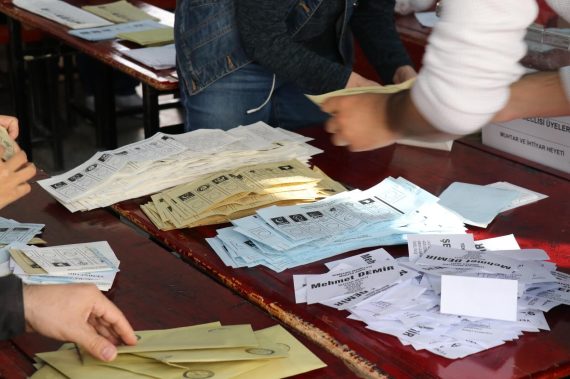Turkey has to some extent left the 31 March local elections behind. The country’s long-lasting democracy has shown great success in reflecting the people’s will and respect to democratic rule in local governance. Unlike western countries, which tend to have low voter turnout, 84,6% of Turkish citizens casted their votes on Sunday. This wholeheartedly proves the internalization of democracy by all social and political groups in Turkey.
What do the election results tell us about Turkey’s political atmosphere? There are a few points worth stressing here. Firstly, the election results showed once again that the People’s Alliance sustained a political majority. The AK Party and the MHP substantially preserved their votes. The total number of votes these parties received were close to the results of the June 24 presidential and parliamentary elections. The AK Party reached the highest percent of votes in its local election history. Thus, the first prominent outcome of these results is the unrivaled power of the AK Party in Turkey’s political arena. Furthermore, the results proved that the People’s Alliance is favored by both voters of the AK Party and the MHP.
The People’s Alliance – the AK Party and MHP – preserved the majority of votes in Turkey’s local elections. The total number of votes these parties received were close to the results of the June 24 presidential and parliamentary elections.
Second is the issue of the relative decrease of AK Party’s votes in metropolitan cities. As a result of this decrease, the AK Party lost Ankara, Antalya, Ardahan, Artvin, Bilecik, Sinop, Burdur, Bolu and Kırşehir to the CHP. Nonetheless, the success of the CHP in these metropolitan cities is related to pre-electoral alliances that the party established with the Iyi Party and the HDP. Especially in Ankara and Antalya, the support of the HDP enabled the CHP to gain a majority of the votes.
Nevertheless, although the CHP won mayoral elections in these cities, it failed to obtain the majority in provincial council elections. In almost all metropolitan cities, the AK Party and the MHP obtained a majority of the representatives in councils. This situation required cohabitation in the governance of metropolitan cities.
Recommended
The third prominent result of the local elections is the reliability of elections in Turkey. Although Turkey’s opposition bloc had always made allegations of fraud or corruption in election results, they were never able to prove these claims. The success of the CHP in metropolitan cities shows that Turkey conducts free and fair elections and opposition parties can win if they garner the support of the masses.
Since there is a minor difference between the votes of AK Party and CHP candidates in Istanbul, the AK Party has applied to the Supreme Electoral Council (YSK) for the re-count of votes in some ballot boxes. Although the opposition parties see this as an intervention by the AK Party, political parties in Turkey can make this recount application to the YSK as a legal right. For instance, as a result of the CHP and HDP’s application, local elections in Yalova and Ağrı had been re-counted in 2014. More, there have always been some objections about the results of ballot boxes, which cause delays in the official declaration of election results. Thus, the current ongoing legal process is not an exception for these elections.
Although the CHP won mayoral elections in Ankara, Antalya and Izmir, it failed to obtain the majority in provincial council elections. In almost all metropolitan cities, the AK Party and the MHP obtained a majority of the representatives in councils.
Another eye-catching result of the local elections is the significant decrease of HDP votes in the eastern and southeastern provinces of Turkey. The HDP lost a significant number of its electoral base in the region. The party lost four major cities; Şırnak, Ağrı, Bitlis, and Tunceli. One of the reasons behind this failure is the successful performance of government-appointed trustees in the region. due to the cooperation between the PKK and HDP municipalities, the state appointed trustees over the last two years. The election results proved that people in the region appreciated the services provided by these trustees in these municipalities. As a result of this appreciation, the AK Party increased its votes and gained three prominent provinces from the HDP. This result also means that people of the region are against the domination of the PKK.
The last point in terms of the prominence in local elections is the dominance of nationalist and conservative politics in Turkey. One of the reasons behind the CHP’s success in metropolitan cities is due to its this character of mayoral candidates. For instance, mayoral candidates in Ankara, Antalya, and İzmir all come from a right-wing background and were able to enhance the votes of this bloc. This means that the main determinant of Turkey’s political climate is nationalist and conservative political understanding. In other words, if a party wants to win, it will not be able to ignore these dynamics in the future anymore.





